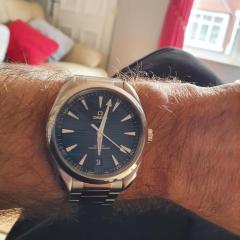Can I use D5 in place of 9501
-
Recently Browsing
- No registered users viewing this page.
-
Topics
-
Posts
-
Hello all, I am working on an older Valjoux Chrono. It doesn't have a stamp on the movement anywhere but I believe it is a Valjoux 72. I installed the train of wheels and they will not turn. The problem appears to be the 4th wheel and the escape wheel are not interfacing correctly. I had to replace both of these parts as the pivots were broken on each. I sourced genuine Valjoux/ETA replacements. I think the problem is with the escape wheel as all the wheels turn perfectly if I remove just the escape wheel. My question to those with more Valjoux experience is am I mistaken? Is this some other model altogether and I have the wrong part or parts?
-
By RichardHarris123 · Posted
I would remove the wheels, check for damage and if not damaged, clean. -
Thanks for the replies! Here's a photo of the front of the clock and a GIF animation of the movement (exposed by removing the black cap in the centre of the clock). You can see the behaviour of the gears. It's a fairly valuable clock from the 80s (Braun ABW 35). I'm not sure if replacing the movement would diminish the value, so I'd prefer to keep the original parts if it's easy to fix. But since the movement itself is pretty generic, I guess, maybe replacing it wouldn't make any difference with regard to the value of the clock? Or would it? I suppose the value is mostly in the design.
-
Well, my fundamental stance is that I want to go in and out without leaving any trace other than a shining, perfectly running movement. So, no scratchings on the inside of the case back lid, no marred screws, no debris, no fingerprints, and so on. That is, my goal is to make it impossible for the FBI to track me down. As a professional, I suppose you might want to keep track of returning watches, but as @JohnR725 mentioned, we can keep detailed computer records without marking the watch at all. That may not be true for every watch, but luxury and COSC-certified movements do have unique numbers. John also says it’s best to leave no sign you were ever there, and I couldn't agree more. Now, suppose the Sea-Dweller I'm working on is one day scrapped, and you want to sell the case-back separately (perhaps the case was destroyed in a plane crash). Then the scribbles on the inside no longer reflect the current movement inside the case. Also, the engraving will likely halve the market value of the case back. It had been "sleeping" for about a week and a half. Yes, the "debris/old lubricant" theory is my hypothesis as well! It will be interesting to see what I find once I have time to start disassembling the movement.
-
I've repaired a few of these, having some success with stripping and cleaning the mechanism. They are so cheap though, its hardly worth the effort in many cases.
-





Recommended Posts